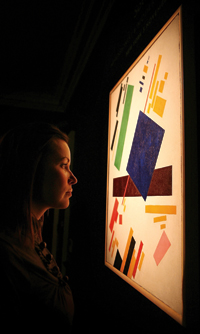CQ WEEKLY – VANTAGE POINT
April 28, 2012 – 9:17 p.m.
Foreign Art: Lending or Looting?
By Shawn Zeller, CQ Staff
Art museums in the United States are at odds with advocates for the preservation of antiquities — and those tracking stolen works — over legislation pending in Congress that would ensure that art lent by foreign governments to American museums doesn’t become the subject of lawsuits in U.S. courts.

|
||
|
The museums say foreign governments are already hesitant to lend art to them because of a 2004 case in U.S. District Court in Washington in which the heirs of Kazimir Malevich, a Russian artist from the early 20th century, sought the return of 14 of his paintings that Amsterdam’s Stedelijk Museum had lent in 2003 and 2004 to the Guggenheim Museum in New York City and the Menil Collection in Houston. Malevich is the founder of the “Suprematism” movement of basic geometric shapes, considered by art historians the first school of abstract painting in modern art. The heirs said his works were stolen sometime after the artist left them with friends in Germany in 1927 before returning to Russia, where he died in 1935.
The city of Amsterdam, which runs the Stedelijk, settled the case before it was decided, returning five paintings to the heirs. And everyone agrees that the U.S. court could not have seized the art no matter its findings, as the State Department now has a process for providing immunity to foreign lenders. But the court could have ordered the Stedelijk to pay damages to the heirs equivalent to the art’s value. As a result, American museums say their foreign counterparts now feel skittish about unwittingly getting embroiled in a U.S. court case.
“If we were to have another instance or two of situations like the Malevich case, we would in our judgment see an almost instant and worldwide stop to foreign loans to American museums,” says Dan L. Monroe, the director of the Peabody Essex Museum in Salem, Mass.
That would come at the cost of cultural exchange, Monroe says. He says that people who believe they are victims of art theft should pursue their claims in the countries that own the works.
The Association of Art Museum Directors has successfully made that case in the House, which last month passed, by voice vote, a bill by Ohio Republican
But advocates for preserving antiquities say Congress has no business taking away the right of claimants to go after stolen artwork. For example, the group Saving Antiquities for Everyone, or SAFE, has begun an email campaign opposing the bills. It says they send “an awful message that is in complete opposition to the U.S. commitment to cultural protection and preservation.”
The Lawyers’ Committee for Cultural Heritage Preservation has likewise called on senators to hold hearings on the Feinstein measure. “The United States has long respected private property rights, and we believe that’s the way the system works now,” says Tess Davis, the group’s executive director. “The rightful owners, be they victims of Nazi looting or antiquities looting, deserve to be able to go to court.”
The problem of the looting of antiquities took on a new urgency after thousands of ancient objects disappeared from Iraq’s national museum following the U.S. invasion in 2003. SAFE was started in response to the looting and tries to raise international awareness of the loss of cultural artifacts.
The provenance of many prominent works of art across the world remains in dispute.
Two years ago, Yale University agreed to give back thousands of artifacts its researchers had taken from Peru when they excavated Inca sites in the early 20th century. The Greek government has long sought the return of the Elgin Marbles from the Parthenon that have been in the British Museum in London for 200 years. Many Jewish families continue to pursue artwork stolen by the Nazis.
Both the Chabot and Feinstein measures would specifically exclude from immunity any claims related to Nazi looting, but opponents of the bill fear that even those exceptions aren’t broad enough since they may not cover art stolen by puppet regimes set up by the Nazis.